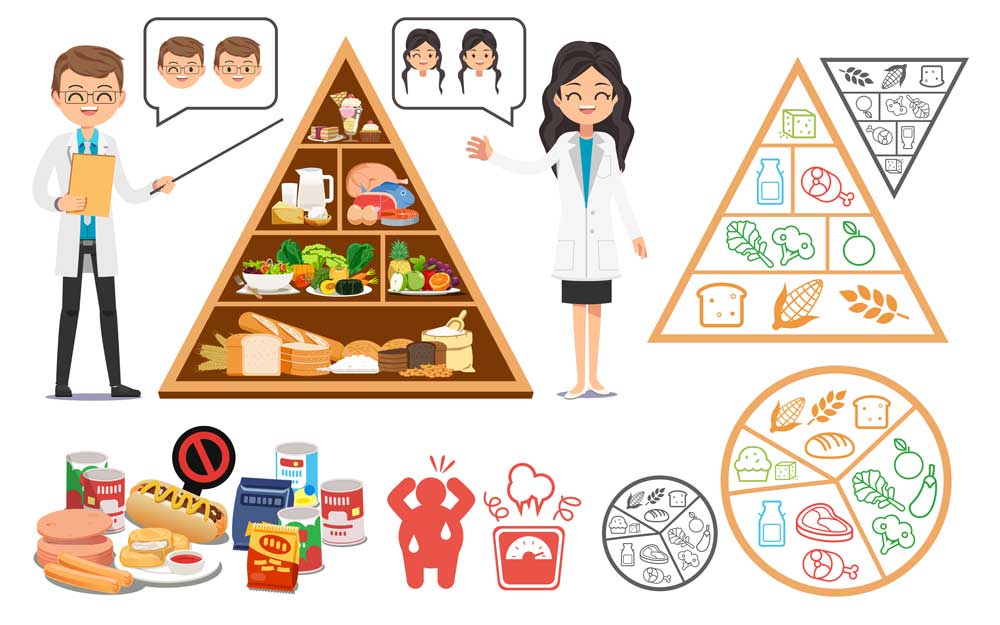
There are really two ways to keep or maintain your health: your diet and exercise. If you want an active life well in to the second half of your life both of these are vital and the earlier you improve your diet the better off you will be.
We always recommend some form of cardio and resistance training in addition to proper nutrition.
On the nutrition side, poor diet often leads to such conditions as high blood pressure, high cholesterol, hypertension, heart disease, prostate cancer, diabetes, and a whole host of other bad ailments. Even small changes in your diet can have long lasting impact so it’s highly worth taking a look at what you may be missing.
As you age you don’t need as many calories so it’s important that the calories you do consume you’re your body what it needs. There are several factors of your diet you want to be concerned with and they are:
Calcium
Most of us consume fewer foods that have calcium such as milk products when we get older. And since your body absolutely needs calcium, if your diet doesn’t have enough it gets it from your bones. That makes your bones dry, brittle, and more prone to break.
Vitamin B12
Your body doesn’t absorb this key vitamin as well when you get older. Saying that B12 has an important role is putting it lightly since it helps make your DNA and red blood cells. Without it you may experience weakness, tiredness, bowel problems, vision loss, depression, memory loss, shortness of breath, just to name a few. Your body can’t produce B12 so it has to come from animal-based foods or supplements. So be careful with this one especially if you are vegan.
Vitamin B9
Other names for B9 are folate and folic acid even though the two have different effects on your health. Not having enough folate increases your risk of heart disease, stroke and cancer. Folic acid is a synthetic version of folate that you find in most supplements. It doesn’t metabolize in the body as B9 as well as folate. Therefore it is best to get your B9 from high-folate whole foods like avocados, leafy greens like spinach, asparagus, and Brussel sprouts.
Vitamin D
The body makes its own Vitamin D when exposed to sunlight. Unless you’re in a warm climate year round that probably means you aren’t getting enough in the winter. Of course if you drink milk with Vitamin D, or some other D-fortified food you may be getting enough. It also occurs naturally in foods like some fish and eggs. Without enough Vitamin D you may have bone pain, cognitive impairment, muscle weakness, and increased risk of death from cardiovascular disease and cancer.
Potassium
Studies show that many older adults don’t get the daily recommended 4,700 mg. Potassium helps your muscles move and it essentially feeds your cells. If you don’t have enough you can experience weakness, fatigue, muscle cramps, and constipation as well as stroke and heart disease. So you can see that not having enough will make it difficult to get the exercise you need. Good potassium sources are sweet potatoes, baked potatoes with skin, white beans, yogurt, orange juice, broccoli, bananas, to name just a few.
Magnesium
This is another one where absorption decreases with age. Deficiencies in magnesium lead to muscle twitches and cramps, fatigue, weakness, high blood pressure, diabetes, osteoporosis, chronic diarrhea, mental disorders, and others. Good sources are almonds, peanuts, cashews, chia seeds, hemp seeds, coffee, popcorn, pumpkin seeds, and dark chocolate.
Fiber
Fiber moves food through your digestive system so it can properly process the nutrients. Fiber deficiency leads to constipation, weight gain, dehydration, poor absorption of key nutrients, high glucose levels. Good sources are fruits, vegetables, and whole grains.
Omega 3 Fats
Benefits of Omega-3s include eye health, reduced risk factors for heart disease and cancer, improved bone and joint health, improved sleep, healthy skin, and quite a few others. Some studies have even linked higher doses of Omega-3s to reduced risk of Alzheimer’s disease. Sources of Omega-3 from fish are mackerel, salmon, cod liver oil, herring, oysters, sardines, anchovies, caviar. Non-fish sources are flax seeds, chia seeds, walnuts, and soybeans.
Water
Since your body is made of mostly water, obviously it is really important to your bodily functions. As you get older you also may tend to be less thirsty so it becomes more important to try and remember to drink, especially if you increase your fiber intake as fiber absorbs water. Knowing you are getting enough is simple. Just make sure when you pee it is fairly clear and you’ll know you’re good.
Superfood Powders
One of the ways we like to make sure we have all of our bases covered with nutrition is through use of superfood powders that we add to fruit and vegetable smoothies. While you shouldn't totally rely on these powders or nutritional supplements, it's not always possible to get the nutrition your body needs so they are like insurance.
See this article for more info: What is the Best Superfood Powder?
Making poor diet choices is one of those things that may not seem to have any immediate impact on you, but your choices will become noticeable over time. The younger you are when you start focusing on improving your diet the more you’ll benefit from it later. But it is never too late to make the right choices.
